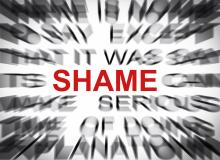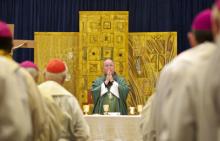public opinion

Monica Lewinsky and Jesus Christ had a similar experience — they both occupied the place of shame.
In 1998, Monica became a lightning rod for shame in American culture. In her recent TED talk, The Price of Shame, she talks about her experience of public shame. With refreshing humor, she takes responsibility for the “wrong turns” she has taken.
The Lewinsky scandal happened on the cusp of the Internet boom. It was one of the first Internet scandals to go viral. Monica reflects that, “What that meant for me personally, was that overnight I went from being a completely private figure, to a publicly humiliated one worldwide.”
But Monica’s point is not that she’s a victim of shame. Rather, she is using her experience to warn us about our cultural inclination to put others in the place of shame. She hopes that sharing her experience “can lead to a cultural change that results in less suffering for others.”
And there has been a lot of suffering. The Internet has become a public hub of shaming. Monica states that, “A market place has emerged where public humiliation is a commodity and shame is an industry.”
Shame is big business on the Internet. Promoting scandals is the easiest method to get clicks. Monica explains the dangers of this economic system in a radically prophetic way:
"The more shame, the more clicks, the more clicks, the more advertising dollars. We are in a dangerous cycle. The more we click on this kind of gossip, the more numb we get to the human lives behind it. And the more numb we get, the more we click. All the while, someone is making money off of the back of someone else’s suffering. With every click we make a choice. The more we saturate our culture with public shaming, the more accepted it is, the more we will see behaviors…that have humiliation at their core. This behavior is a symptom of the culture we have created."
A culture of shame is more than making money on the Internet. It’s also about developing a sense of moral superiority over and against another person. Gossip sites are addictive because they allow us to feel good about ourselves at the expense of another. Notice that we feel the need to gossip and scapegoat others because we don’t feel good about ourselves. And so we unite with others against another person. Gossip boils down to this thought that runs through our heads: How could they do such a stupid thing! At least I’m not as bad as them!

Pope Francis appears more popular than ever among American Catholics, and he hasn’t even visited the U.S. yet, a trip that is planned for September and could well boost his visibility — and appeal — even further.
But will Francis find American Catholics filling the pews? Or just loving the pope from afar? That’s one of the big — and so far unanswered — questions about his remarkable papacy.
Now, one researcher may have found some signs, albeit tentative, of an incipient “Francis effect.”
Mark Gray of Georgetown University’s Center for Applied Research in the Apostolate crunched the Catholic numbers from the 2014 General Social Survey, the go-to resource for sociologists. The GSS began in 1972 and is conducted every two years using face-to-face interviews with a national random sample of adults.
Gray noted that when asked to characterize the strength of their religious affiliation, 34 percent of Catholics said it was “strong,” up from 27 percent in 2012, the year before Francis was elected.
That 7-point rise was a “significant bounce,” Gray said.

[A] POPULAR consensus is forming around the fact that new world realities demand fresh policies, beyond militarism. Public opinion is increasingly sophisticated about military and foreign policy issues. This is in large part due to the efforts of the peace movement.
A significant share of the peace movement's task is to promote political literacy in our own country. Every town meeting organized, every opportunity arranged for people to make their own judgments and come to their own decisions about U.S. foreign and military policy is an investment in future social and political change. As people are confronted with these moments of decision, they are given the information, the tools, the sense of their own power to determine the shape of national security policies.

When New York Cardinal Timothy Dolan told national news programs on Easter Sunday that Catholic leaders need to do a better job of showing that their opposition to gay marriage is not “an attack on gay people,” the nation’s top Catholic bishop seemed to be signaling an important shift in tone, if not policies, that acknowledges two new realities.
One is the election of a new pope, Francis, who in less than a month has demonstrated a clear preference for engagement and inclusion (washing the feet of women and Muslim inmates at a Rome youth prison, for example) rather than the confrontation and political purism that often found favor under his predecessor, Benedict XVI.
The other is the ongoing shift in favor of same-sex marriage in the court of public opinion and — if recent arguments on Proposition 8 and the Defense of Marriage Act are any guide — perhaps soon in the U.S. Supreme Court.
In an opinion piece for Bloomberg View, Michael Kinsley writes:
As demand starts to build on President Barack Obama to “do something” about the deteriorating situation in Syria, let’s review where the U.S. and its citizens stand on the general question of using military force abroad. On this issue, Americans are divided in strange ways. It’s no longer a matter of hawks and doves. There are liberal hawks and conservative doves as well as conservative hawks and liberal doves.
Read his full piece here